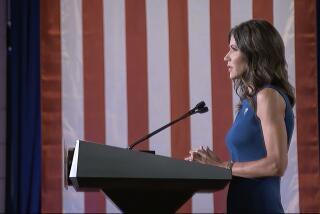No Shortage of Promises as Clinton Opens Final Push
It was a placid week that ended with a “‘Whoa!” The Democratic National Convention was distracted by the embarrassing resignation of President Clinton’s top campaign strategist, Dick Morris, after tabloid allegations that Morris shared campaign secrets with a Washington prostitute. News of the controversy and resignation brought an exclaimed “Whoa!” from Tipper Gore, not to mention a similar reaction from much of the press corps gathered in Chicago.
But Dick Morris, a man unknown to most Americans, is not running for president. (“I hear he’s brilliant in his field,” said one Rhode Island delegate, “but sometimes brilliant people lack common sense.” Enough said.)
President Bill Clinton, distractions aside, attempted all week, from his Truman-like train trips to his convention speech, to make his case for a second term. In this campaign, Clinton would do well to remember a lesson from the first term: Campaign promises cannot be created just to please and appease. It is better to promise less and deliver more.
The first-term promise to “end welfare as we know it” was a huge but deliverable promise. The problem was that Clinton first turned his attention to an even more mammoth challenge, reforming the U.S. health care system. That was a noble goal, but major reforms rarely result from the shove-it-down-the-throat manner that the president and Mrs. Clinton exhibited, even with the then-Democratic Congress. By the time that bruising battle with Capitol Hill was essentially lost, Clinton had squandered a lot of political capital. Had he focused first on his welfare promise, he might not have been stuck with the seriously flawed bill he wound up signing under the pressure of this year’s reelection campaign.
Clinton last week made an almost dizzying number of proposals for his second term. One was a literacy program that would offer $300 million in grants for programs to train parents to help their children to learn to read; $2.5 billion for after-school and summer tutoring programs, additional funding to extend Head Start for 1 million children and public-private partnerships with private and nonprofit groups to encourage reading. Clinton said $1 billion would come from existing funds and more could be raised through the repeal of some business tax breaks.
Other proposals included a targeted capital gains tax cut for homeowners, costing about $1.4 billion; tax credits and grants totaling $3.4 billion to generate jobs in areas heavily populated by welfare recipients, and a $1.9-billion plan to help clean up polluted lands and waters. These proposals will have to be more specifically explained and analyzed in the course of the campaign. It’s predictable, though, that Bob Dole, the Republican presidential candidate, will go after the proposals, whether they have much or little merit, as a repudiation of Clinton’s assertion in his 1995 State of the Union address that “the era of big government is over.” Government has its rightful place in helping its citizens. But those who aspire to lead government during a period of taxpayer skepticism must make their priorities clear and their follow-up swift.
More to Read
Get the L.A. Times Politics newsletter
Deeply reported insights into legislation, politics and policy from Sacramento, Washington and beyond. In your inbox three times per week.
You may occasionally receive promotional content from the Los Angeles Times.






